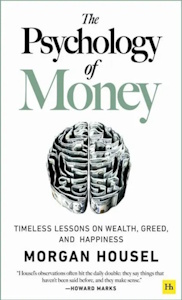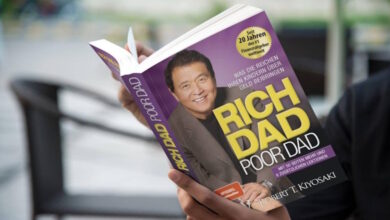The Psychology of Money by Morgan Housel – Honest Book Review
The Psychology of Money by Morgan Housel – Book Review for Indian Readers
 Money is one of the most important aspects of our lives. We earn it, save it, spend it, and sometimes even stress over it. But how often do we think about why we behave the way we do with money? That’s exactly what Morgan Housel explores in his bestselling book, The Psychology of Money. This article is a humanly written, easy-to-understand review of this popular book – specially prepared for Indian readers.
Money is one of the most important aspects of our lives. We earn it, save it, spend it, and sometimes even stress over it. But how often do we think about why we behave the way we do with money? That’s exactly what Morgan Housel explores in his bestselling book, The Psychology of Money. This article is a humanly written, easy-to-understand review of this popular book – specially prepared for Indian readers.
Why This Book Matters
Finance books often talk about numbers, charts, and complex theories. But The Psychology of Money is different. Morgan Housel doesn’t teach you where to invest or how to get rich quick. Instead, he focuses on something more powerful – our relationship with money. He explains that how we think and behave around money is more important than how much we know.
In India, where financial conversations are still not open in many households, this book helps readers understand that wealth-building is not only about strategy – it’s about mindset and behavior.
Key Lessons from the Book The Psychology of Money
1. Behavior Beats Intelligence
One of the strongest messages in the book is that you don’t need to be a genius to be good with money. Many people with high incomes still struggle financially because they don’t have the right habits. On the other hand, someone with average income but disciplined savings can become wealthy. This is especially relevant in India, where a lot of people still believe that financial success comes only from big salaries.
2. Luck & Risk Are Two Sides of the Same Coin
Housel explains that luck and risk play a major role in financial outcomes. For example, someone might get rich by investing in the stock market, while another might lose money doing the same thing. Both luck and risk are real – and it’s important to stay humble and not judge people based only on results. This is a powerful lesson for investors in India, especially during times when the stock market feels unpredictable.
3. Compounding Is Magic
The book highlights how compounding works best when given time. Housel shares stories of people like Warren Buffett, who became rich mainly because they started investing early and stayed invested for decades. For young Indian readers, this is an eye-opener. It shows that you don’t need a lot of money to start investing – you just need time and patience.
4. Save More Than You Think You Need
Housel encourages readers to save not just for planned expenses, but also for the unknown. In a country like India where many emergencies like medical expenses, job loss, or sudden family responsibilities arise, this advice is gold. He says, “The only way to be wealthy is to save money – not just earn it.”
5. Financial Freedom > Showing Off
In India, there’s often pressure to display success – whether it’s through cars, clothes, or weddings. The book explains that real wealth is what you don’t see. It’s the money saved and invested, not spent. This message is crucial in today’s social media-driven world.
Writing Style & Readability
Morgan Housel writes in a simple and storytelling style. He uses real-life examples, historical references, and personal anecdotes that make the book engaging even for people who are not into finance. Indian readers, especially those just starting their financial journey, will find the language approachable and the concepts relatable.
You don’t need a background in economics or investment to enjoy this book. It feels like a conversation with a wise friend – not a lecture from a finance professor.
How Indian Readers Can Benefit from The Psychology of Money
Although the book is based on American contexts, the principles are universal. Whether you’re a college student, a working professional, or a homemaker in India, the core ideas apply to your life:
-
Young Professionals can understand the importance of starting early and saving consistently.
-
Parents can learn how to teach their kids about financial discipline.
-
Entrepreneurs can appreciate the role of risk, patience, and long-term thinking.
-
Investors can balance optimism with caution, avoiding panic during market volatility.
The book also encourages readers to define their own version of success, instead of copying others. This is refreshing in an environment where everyone seems to be chasing similar goals.
Criticism – What Could Be Better
While the book is full of wisdom, some readers might feel that certain points are repeated across chapters. A few ideas are stretched out and could have been more concise. Also, Indian readers looking for direct advice on Indian financial instruments (like PPFs, mutual funds, etc.) won’t find that here – because the book focuses on mindset, not specific tools.
Still, this doesn’t take away from the overall impact of the book.
Final Verdict
The Psychology of Money is a must-read for anyone who wants to improve their relationship with money. It’s especially useful for Indian readers who are new to financial planning or are rethinking their money habits.
It doesn’t promise to make you rich overnight. Instead, it gives you something more powerful – the wisdom to think long-term, stay calm, and build real wealth slowly but surely.
If you’re looking for a finance book that feels more like life advice than a textbook, this is the one for you.
FAQs: The Psychology of Money by Morgan Housel
Q1. Is this book suitable for beginners in finance?
Yes, absolutely! The book uses simple language and focuses on mindset rather than technical finance. Even if you’re just starting, you’ll understand it easily.
Q2. Does this book give investment tips?
Not directly. The book is more about how to think about money, not where to invest. It builds your financial mindset, which is just as important.
Q3. Is this book useful for Indian readers?
Yes. While the examples are mostly American, the lessons are universal. The advice on saving, long-term thinking, and avoiding lifestyle inflation is very relevant in India.
Q4. How long is the book?
The book has around 20 short chapters and is roughly 240 pages long. You can easily finish it in a week, even with a busy schedule.
Q5. Can teenagers read this book?
Definitely. In fact, it’s a great book to introduce teenagers and college students to the basics of personal finance and money behavior.
If you’re planning to buy The Psychology of Money, this could be one of the best investments you’ll ever make – not just for your wallet, but for your peace of mind too. You can buy from all popular platform
The Psychology of Money
Our Review Score
Total Score 5/5 - 70K+ Download
Timeless lessons on wealth, greed, and happiness doing well with money isn?t necessarily about what you know. It?s about how you behave. And behavior is hard to teach, even to really smart people. How to manage money, invest it, and make business decisions are typically considered to involve a lot of mathematical calculations, where data and formulae tell us exactly what to do.



